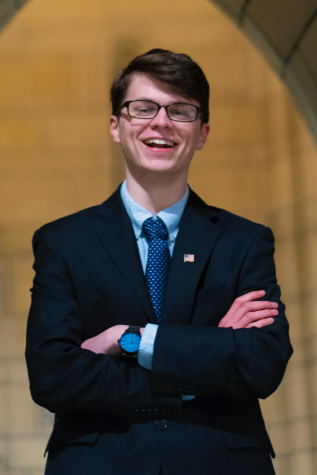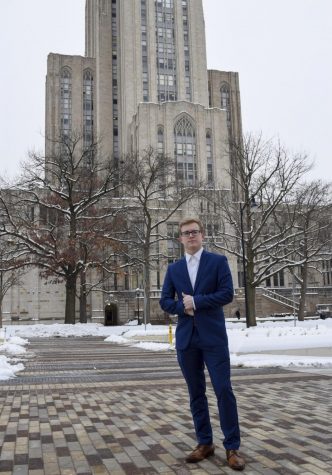SGB newcomers push for more ‘outsiders’ in the organization
Sarah Cutshall | Visual Editor
Twelve students are running for a position on the Student Government Board, in addition to three students running for the position of SGB president.
February 22, 2021
For Joseph Landsittel, Student Government Board needs to be more welcoming to “outsiders” — such as himself — in running for high-up positions.
“This isn’t a criticism of SGB or anyone in SGB, but I will say that there is a cultural change that needs to take place in SGB when it comes to perspective towards outsiders running,” Landsittel, a junior applied mathematics major running for president, said.
Landsittel said if he were elected president he would want to change the “culture” and “perspective” of SGB so it’s more open to others’ ideas.
“You know, people within SGB, they believe that they should be the ones running for these positions because they believe that they’re uniquely qualified because they’ve had all this experience within SGB,” Landsittel said. “In my mind we need to sort of change that culture, change that perspective, because anybody who has good ideas should be open to running because when there’s a diversity of opinions in the room, everybody’s better off.”
Landsittel is one of the seven people running for a position in SGB this election who have little to no previous experience in the organization. There are 15 people running for the March 2 election — 12 for a board position and three for president. Many of these newcomers are pushing for internal change in SGB.
Most candidates are running in slates — which are similar to a political party — and two are running as independent candidates. Two of the slates — Brightside and Elevate — are composed entirely of students with one or more years of experience in SGB. Students who lack prior experience with SGB make up the other two slates — Vision and Betterment.

Most of the SGB candidates running this year share similar goals — making communications between the board and the student body more efficient, involving student leaders in major decisions, making meetings and allocations decisions more public and operating with more transparency.
Daniel Temmallo, who is running for a board position as an independent, said when voters make their decision, they tend to distinguish the candidates by their experience.
“I think in regards to SGB, there’s sort of a pipeline, where you go from First Year Council, to a committee, to the Student Government Board,” Temmallo, a first-year political science and public and professional writing double major, said. “I think that this pipeline is very attractive for voters, because voters go on, and if they don’t know all of the people, they look at the experience.”
Temmallo said what he described as a “pipeline” starting with SGB’s First Year Council shouldn’t determine someone’s future in the organization.
“Sometimes people come into college, and they don’t know what to do,” Temmallo said. “I don’t think that if you choose not to join FYC in the first three weeks of your college life that should dictate whether or not you’re able to be on the Student Government Board for the next four years of your college career.”
Temmallo added that he hopes voters can recognize the capabilities of people who didn’t follow this path. If elected, Temmallo wants to increase SGB’s social media activity and send out emails summarizing the organization’s activities to the student body.
“I feel like there’s distrust towards people who aren’t in that pipeline,” Temmallo said. “It would mean a lot for voters to recognize that any student from across the University has the capability and the capacity and willingness to serve on the board.”

One of the current board members who didn’t follow this conventional path is Victoria Chuah. Chuah was one of the four people elected to the board last year who didn’t have any previous SGB experience. She said she didn’t initially realize this position would be possible for her after she didn’t join FYC her first-year.
“When I got to college I honestly didn’t really understand how SGB worked, I knew there was hall council and that was about it. FYC wasn’t really advertised that well to me and hall council didn’t interest me, so I thought, I guess my student government experience is over,” Chuah said. “Last year, Katie, my roommate, was thinking about running and was like would you want to run with me? I knew you did this in high school, and I was like, totally.”
When Chuah ran for board last year — before the COVID-19 pandemic — her biggest goal was increasing space on campus for cultural dance groups to practice. This concern followed a November 2019 University policy banning dance teams from practicing in Posvar Hall or risk losing access to the University’s online platform to book on-campus spaces. She said this hasn’t been a priority post-pandemic.
“My biggest initiative going in was, I really wanted to talk about dance spaces, and get more designated dance spaces on campus, and that was completely blown up because of coronavirus,” Chuah said. “When we’re talking about designated spaces on campus, that isn’t what we’re talking about now. We’re talking about where students can eat.”
But Chuah said she was able to work with the LGBTQIA+ task force and host two safety fairs as the Facilities, Technology and Transportation committee liaison. Chuah said that while learning the ins and outs of SGB was difficult when she first started, she recommends that anyone join — whether they have experience or not.
“Do it. I am so happy that I did,” Chuah said. “You don’t have to have been in the FYC pipeline to do it. Do it because you want to make a change.”
Katie Richmond and Victor So — two of the other newcomers to this year’s board — didn’t respond to a request for comment and declined an interview, respectively.
While Landsittel is relatively new to SGB, he was a staff member for the 19Forward slate, on FYC and the Community and Governmental Relations committee during his first year in 2019. He agreed with Chuah that SGB experience isn’t the most important aspect of serving on the board, and if elected he hopes to restructure public meetings so that decisions and conversations about how student money is being spent with respect to the activities fee is “out in the open where anybody can voice their opinion.”
“In my mind, I don’t think that SGB experience is the central experience for this,” Landsittel said. “What really matters is listening to students, hearing their concerns and being aware of what issues need to be addressed around campus.”
Harshitha Ramanan, a sophomore neuroscience major running as an independent for president, said she also has plans to make SGB’s operations more open to the public. Ramanan said she plans on creating a weekly town hall specifically for students to voice concerns to the board.
“I would like to create a space, an hour, sort of like a town hall, where people can come, every week,” Ramanan said. “I think this could begin to bridge the gap between the general student body and the administration.”

Ramanan said because of the COVID-19 pandemic, the training she received in Resident Student Association was “completely scratched.” Because of this, Ramanan said she will be able to adapt quickly as the University makes the transition to a post-pandemic world.
“Newer candidates don’t know exactly what’s been going on in every single meeting, so they’re going to bring up new points, new things to be addressed, new ways to tackle the same problems, and I think that’s going to be a lot more effective,” Ramanan said. “I’m a firm believer that if you’ve been doing something for a really long time, you probably are no longer doing it well.”
Editor’s Note: This article has been updated to more accurately reflect Landsittel’s first-year experience in SGB and Ramanan’s training experience in RSA.



